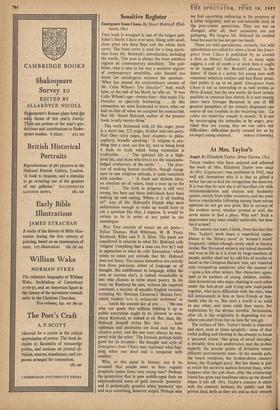Sensitive Register
Tins book is wrapped in one of the largest pub- lisher's blurbs I have ever seen, filling with small, close print two deep flaps and the whole back cover. The front cover is used for a long quota- tion from Mr. Holroyd's introduction, including the words, The poet is always the most sensitive register of contemporary sensibility.' The pub- lisher, who is also in his way a sensitive register of contemporary sensibility, asks himself (no doubt for sociological reasons) the question : 'What has caused the extraordinary success of Mr. Colin Wilson's The Outsider?' And, much later, at the end of his blurb, he tells us : 'It was Colin Wilson's age—twenty-four—that made The Outsider so specially interesting. . . . In this connection we were fascinated to learn, what we had no idea of when we accepted his manuscript, that Mr. Stuart Holroyd, author of the present book, is only twenty-three.'
The work festooned with all this eager prose is a short one, 222 pages, divided into two parts. Part One—sixty pages, four chapters—is philo- sophical, broadly speaking : `A religion is any- thing that a man can live by, and in being lived it finds its truth which being existential is irrefutable. . . ."The spiritual life is a high- level life, and those who live it are the unacknow- ledged aristocracy of the earth.". . . The prac- tice of making human sacrifices, though repug- nant to one religious attitude, is quite consistent with another. . . ."A fixed and definite ideal, an absolute set of values, keep a man up to the mark.". . . The faith in progress is still very strong, but here and there individuals have been waking up and asking, Where is it all leading to?' Any of Mr. Holroyd's friends who were unfortunate enough to wake up would have to ask a question like that, I suppose. It would be certain to be in order at any point in the monologue.
Part Two consists of essays on six poets— Dylan Thomas, Walt Whitman, W. B. Yeats, Rimbaud, Rilke and T. S. Eliot. The poets are considered in relation to what Mr. Holroyd calls `religion' ('anything that a man can live by') and in opposition to what he calls 'humanism,' which seems to mean any attitude that Mr. Holroyd does not fancy. The essays themselves are entirely free from precision, either of language or of thought. His indifference to language, either his own or anyone else's, is indeed remarkable in one who chooses to write about poetry. In his essay on Rimbaud he uses, without the required comment, a number of maudlin English versions, including Mr. Norman Cameron's 'Bateau lyre,' which renders `vers le cre puscule embaume' as `. . . 'neath the scented sky of eve. . . .' No one who can quote that without holding it up to public execration ought to be allowed to write about Rimbaud, or indeed at all. But, then, Mr.
Holroyd himself writes like this : . . both optimism and pessimism are dead ends for the creative artist, and the one must always be tem- pered with the other.' The formula perhaps holds good for its inventor : the thought and style of Emergence from Chaos may represent what hap- pens when one dead end is tempered with another.
Why, at this point in history, can it be assumed that people want to hear vaguely prophetic noises from very young men? Perhaps the generation that is now middle-aged feels an unprecedented sense of guilt towards 'posterity' and is pathetically grateful when 'posterity' ups and says something, however stupid. Perhaps also we find something endearing in the presence of loose relipiosity, and an anti-scientific bent, in the post-atomic generation. They are not so changed, after all; their mutations are not galloping. We forgive Mr. Holroyd his swelled head because he has not got two heads.
These are wild speculations, certainly, but wild speculations are called for when a book like Emer- gence from Chaos is published by so slirewd a firm as Messrs. Gollancz. if, as many signs suggest, a cult of youth is at work here it ought to be `nipped' (in Mr. 13eckett's phrase) 'in the doom.' If there is a public for young men with vehement nebulous notions and bad fluent prose, that public is up to no good. Emergence from Chaos is not as interesting or as well written as Mein Kampf, but the two works do have certain qualities in common (see above). It is now twenty years since Georges Bernanos in one of ttf6 greatest pamphlets of the century diagnosed one source of our troubles in the recurring line : `La colere des imbeciles remplit le monde.' it is not by encouraging the imbeciles to be angry, pro- vided they are young, that we can solve our difficulties: difficulties partly created for us by


































 Previous page
Previous page